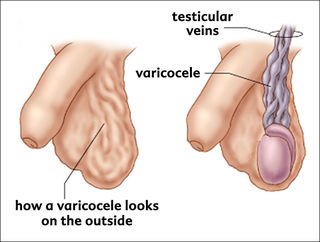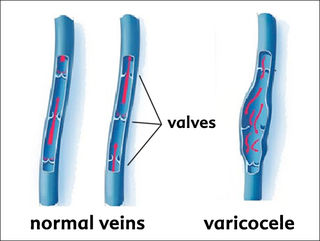Infertility
Varicoceles—A Common Cause of Infertility in Men
They can make the scrotum too warm, lower testosterone, and shrink testicles.
Posted January 9, 2016 Reviewed by Davia Sills
The testicles need a supply of fresh blood to function correctly. It’s not difficult for the heart to pump blood into the testicles. The problem is how to get the blood in the testicles back to the heart when a man is standing.

To help keep the blood from flowing backward, the veins leading away from the testicles contain small, one-way valves. When these valves aren’t working correctly, the blood can pool in the veins and make them bulge like a small bag of worms. This creates a condition that’s called a varicocele.
Varicoceles are only prominent when a man is standing, and the pull of gravity is at its worst. Varicoceles usually subside when he is lying down.
Approximately one out of six or seven boys between the ages of 15 and 25 have a varicocele. This is the age when the testicles are growing and need an increased supply of blood.

Most varicoceles occur above the left testicle only. While they can sometimes be over both testicles, it is rare that a varicocele will occur on the right testicle only.
This could be because the distance the blood travels from the left testicle to the heart is several centimeters longer than from the right testicle to the heart. Also, the blood from the left testicle doesn’t always flow as smoothly as the blood from the right due to a bend in the vein somewhere near the left kidney.
Approximately 35 percent of men with a varicocele are infertile. This doesn’t seem logical, because varicoceles usually involve only one testicle; the other should be free to produce healthy sperm. However, varicoceles cause the entire scrotum to be warmer than is healthy for sperm production. This could explain why varicoceles can cause infertility when they only involve one testicle.
While it’s normal for testicles to vary in size up to 20 percent, the testicle on the left can become much smaller than the one on the right when there is a varicocele. If that’s the case, surgery may be considered.
Most males who have varicoceles can’t feel them. When they do, it’s often after hard exercise or on a hot day with a lot of standing. If a varicocele causes a dull ache or pain, surgery is often considered.
Surgery is also recommended when it appears that a varicocele is causing sperm production to be abnormal or is lowering a man's testosterone levels. Varicoceles should be examined by a urologist who has experience in evaluating them.
The "worms in a bag" look can take a psychological toll on some men and can be a reason to have the varicocele surgically treated, in addition to the other problems that varicoceles can cause.
Varicoceles do not cause cancer of the testicles nor are they associated with it. An excellent source of information about varicoceles is the Teenage Varicocele Association. The Turek Clinic also has helpful information.


